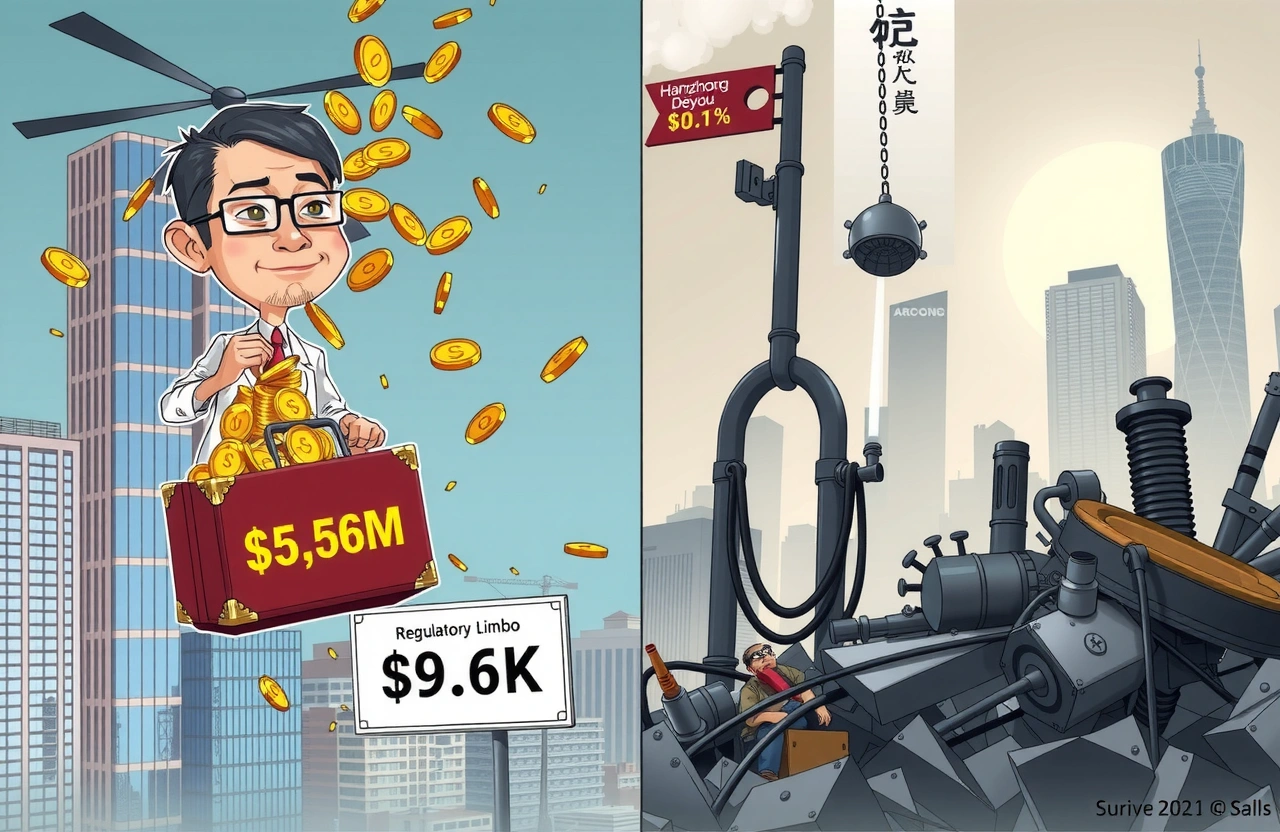Key Takeaways
– Dr. Song Ning (宋宁), founder of AI chromosome diagnostics firm Desheng Biological, cashed out over $5M before IPO filing
– Company faces severe cash crunch with only $556,000 remaining despite $256M valuation
– Core business revenues declined 7% with capacity utilization halving year-over-year
– $1 subsidiary sales and mystery shareholder transactions raise governance questions
– Future hinges on regulatory approval for AI AutoVision® diagnostic system
The Pre-IPO Cash-Out That Raised Eyebrows
As Desheng Biological charges toward a Hong Kong IPO, founder Dr. Song Ning (宋宁), a 43-year-old scientist with dual backgrounds in computer science and medical genetics, executed a controversial financial maneuver. The CEO quietly sold over $6.6 million worth of shares through multiple transactions between 2021-2023, reducing his direct stake while maintaining 52.06% voting control through investment platforms. This pre-IPO cash-out occurred while the company’s financial health deteriorated alarmingly – by April 2025, cash reserves had plummeted to just $556,000 (unaudited) despite a $256 million valuation from June 2025 investors.
Dr. Song leveraged his academic pedigree – including a Ph.D. from Japan’s Nagasaki University and former professorship at Shanghai Jiaotong University Medical College – to attract early investors. But his capital management reveals tactical maneuvering: he twice repurchased shares at original prices from early backers like Deqing Technology and Yuhang Industrial Fund, effectively zeroing out their returns while reclaiming control. Financial analysts question the timing of these transactions given the company’s dwindling resources.
Control Retention Strategy
Song structured ownership through four investment vehicles (Deshinonuo Hui, Deshinonoda, Deqian Technology, Deshinonoxin) ensuring majority voting power despite reducing direct equity. This sophisticated ownership architecture showcases how tech founders balance dilution risks against funding needs.
Unusual Exit Patterns
The most eyebrow-raising transaction involved natural shareholder Yang Xi (杨曦). In February 2021, she acquired 3% for $141,000 claiming “valuable sales experience,” despite having no known medical sales background. Yang had previously invested in molecular diagnostics firm Sansure Biotech before its 2020 IPO. She exited in 2023 with a $123,000 profit after achieving none of the promised sales targets.
Mounting Financial Pressures
Core Business Erosion
While riding China’s booming medical AI wave – a market projected to grow from $1.49B to $195B by 2030 – Desheng’s fundamentals weakened. Chromosome analysis equipment sales dropped 7% year-over-year to $4.08 million (2024) with gross margins collapsing nearly 20 points to 56.7%. More alarmingly:
– Diagnostic reagent sales plunged 59%
– Consumables production fell from 99,000 units to 7,200
– Rent/licensing revenue evaporated completely
Resource Underutilization
Manufacturing metrics reveal systemic issues:
– Medical equipment capacity utilization fell from 28.6% to 12.4%
– Testing reagent lines operated at just 22.5% capacity despite 4x expansion
– Staffing shrunk 30% with layoffs eliminating 61 positions
Strategic Gambles and Governance Questions
The $1 Asset Fire-Sale
Days before submitting its Hong Kong IPO application, Desheng sold two fully licensed subsidiaries – Hangzhou Deyou Medical Lab and Chengdu Niuhou Internet Hospital – for just $0.14 each. Both had valuable certifications: Deyou won $125K healthcare contracts in 2022, while the internet hospital held active medical practice permits. The company cited “focus on core business,” but industry analysts speculate about hidden liabilities.
Betting Everything on AI
The company pins survival hopes on its AI AutoVision® diagnostic platform. Despite lacking regulatory approval (submitted June 2025), management claims revolutionary potential:
– First AI-assisted chromosome analysis system globally
– Processes 100 cell images/hour versus technicians’ 20/day
– Trained on >500K clinical samples
Its foundational iMedImage™ technology demonstrates promise – the medical imaging SaaS platform delivered $2.7 million revenue (38% of total) with 97.2% margins in 2024. Yet without commercialization approval, Desheng remains in regulatory limbo.
The Uncertain Road Ahead
- Cash Burn Crisis: At current $5.4M/year operating costs, Desheng’s reserves cover barely 37 days
- Receivables Risks: Medical institution debts ballooned 429% to $4.5 million
- Mounting Payables: Liabilities surged 194% during IPO preparation
- Market Skepticism: Chromosome diagnostics CAGR languishes at 6.7% despite AI promise
With vanishing cash reserves and key asset disposals preceding its public listing, Desheng Biological exemplifies how founder opportunism can undermine enterprise stability. The company’s prospectus dedicates 80% of proposed IPO funds to commercializing its untested AI system – possibly China’s most expensive regulatory gamble. Investors must scrutinize whether regulatory delays mirror deeper technological flaws. As China grapples with governance reforms following scandals like Kangmei Pharmaceutical’s $10B fraud cases, Desheng’s trajectory offers crucial lessons about balancing founder liquidity with corporate sustainability.



